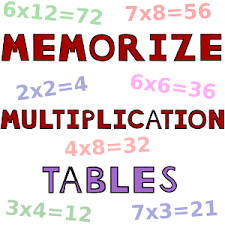 Should Students Memorize Multiplication Facts?
Should Students Memorize Multiplication Facts?
I have been struck recently on how many students (and adults) struggle with multiplication. This skill is so basic to math that lack of mastery makes progress in math very difficult, at best. I am not even concerned so much about multiplication of positive and negative numbers as knowing what 6×7 is, for example, because it is hindering many students in higher math.
I don’t believe that a person needs to know “what” multiplication is, for example 6×7 is 6 groups of 7. The multiplication facts are more like the basic phonemes or words of math. When you learn to speak your native language as a child, you don’t really understand the meaning of the words, you are learning and mimicking the sounds and patterns.
As a young pre-teen, I was determined to learn the Morse code in order to become a Ham Radio Operator. I spent time memorizing the code, like a is dot-dash, b is dash-dot-dot-dot, and so forth. I found that I was limited in the speed I could decode the sounds because of the way I was learning the code. I would hear dot-dash and count the dots and dashes.
Unfortunately the requirement for the General Class license was 13 words a minutes, well beyond the mere 5 words a minute I could muster by counting the dots and dashes. My breakthrough came when an older Ham told me, “you can’t just count the dots and dashes, you have to hear the patterns”.
So I started listening for the patterns, so that a was not simply dot-dash, it was a short beep followed by a longer beep. In listening for the patterns I was able to boost my speed up to 18 words per minute, well above the required speed. After a while, you tend to hear whole words and ending as a single unit, so you aren’t just decoding single letters but whole words, much like we learn to hear a language.
So what does all this have to do with learning to multiply? I propose that it is easier to learn the multiplication facts by seeing the patterns and learning the patterns without trying to understand what they mean. That will become clear as you use them. Young children are like sponges and have no trouble learning repetitious and sometime annoying things. Why not teach them the multiplication tables? In the past, memorization devices like catechisms were used to teach children profound truths that they didn’t understand but became part of their knowledge and understanding when they were older.
For older children, repetition is the key. Use all the senses: writing the facts, seeing the facts, hearing the facts spoken, speaking the facts (or singing the facts?). The more senses can be brought into the memorization process, the better.
It is never too late, even for adults, as the human brain is amazingly elastic. If you know what kind of learner you are (visual, audial, tactile) then use that to your advantage. The nice thing about memorization, especially for adults is that it expands the use you have of your mind. So make a point to learn and master the multiplication tables. You will be glad you did.
